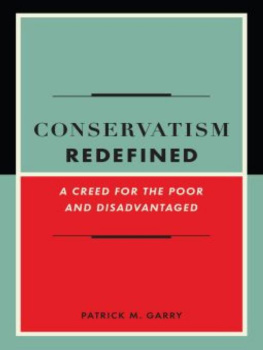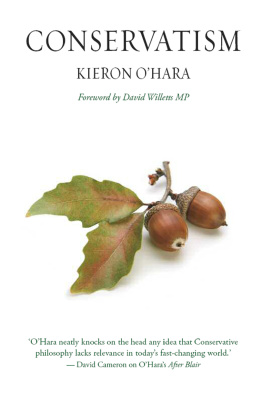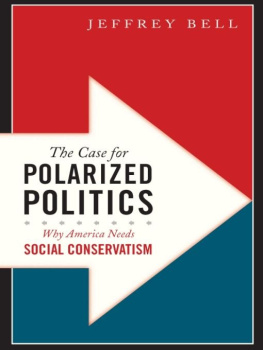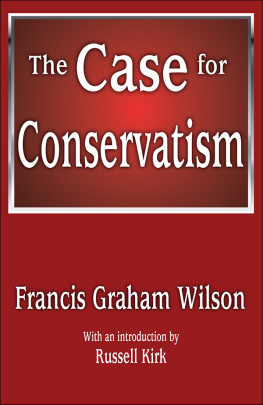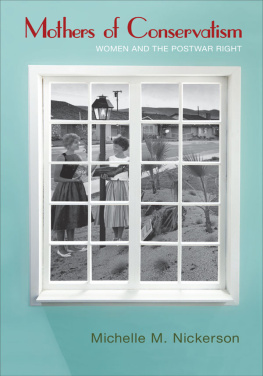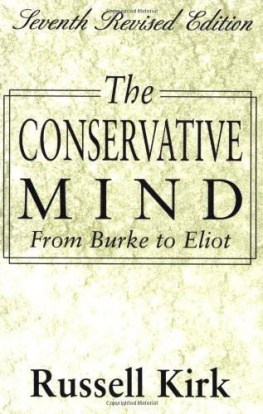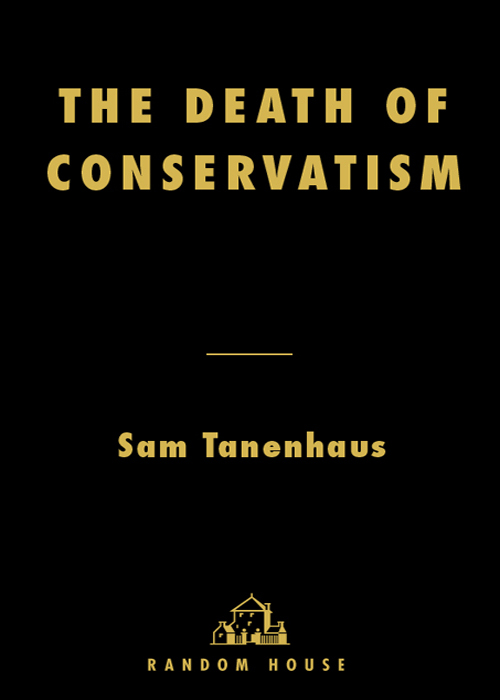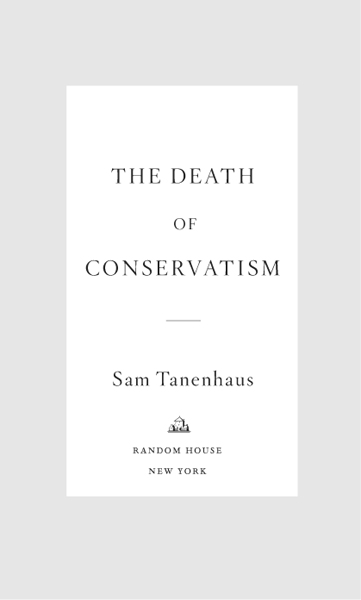ALSO BY SAM TANENHAUS
Whittaker Chambers: A Biography
To my mother,
Gussie Hecht Tanenhaus,
on whom nothing is lost.
God preserve me from ideologues.
DANIEL PATRICK MOYNIHAN
Contents
1

RIGOR MORTIS
A merican history is the record, were often told, of beginningsdating back to the first settlements planted on the fresh, green breast of the new world, as F. Scott Fitzgerald wrote in The Great Gatsby, his classic tale of self-reinvention. The aura of newness was not merely a sentiment but also a statement of purpose inscribed in our republics founding documents and asserted in the legend novus ordo seclorum, the new order of the ages, stamped on the Great Seal of the United States.
This ideal has been repeated in an almost unbroken series of rededications of political purpose: Lincolns new nation, conceived in Liberty, Theodore Roosevelts New Nationalism, Woodrow Wilsons New Freedom, Franklin D. Roosevelts New Deal, John F. Kennedys New Frontier, andcircling back to the Great Seals inscriptionGeorge H. W. Bushs New World Order.
Through all this reinvention runs the theme of American exceptionalism, of a people liberated from the dragging chains of the past.
But of course history is also about endings, and so it has been in America, too. Our cherished myth of continual forward motion rests on dramatic breaks with what came before, whether the suppressions of a state church and the injustices of distant monarchy or our own discarded legacies of slavery and willful isolation from the outside world with its imposition of entangling alliances.
This cycle of beginnings-in-ends is being repeated again today. We stand on the threshold of a new era that has decisively declared the end of an old one. In the shorthand of the moment this abandoned era is often called the Reagan Revolution. In fact it is something larger and of much longer duration: movement conservatism, the orthodoxy that has been a vital force in our political life for more than half a century and the dominant one during the past thirty years, vanquishing all other rival political creeds until it was itself vanquished in the election of 2008.
This moments emerging revitalized liberalism has illuminated a truth that should have been apparent a decade ago: movement conservatism is not simply in retreat; it is outmoded. The evidence is not recorded merely in election returns and poll ratings. Those are unreliable and unstable measurements, spontaneous snapshots, subject to sudden change. The more telling evidence is in the realm of ideas and argument. It is there that conservatism is most glaringly disconnected from the realities now besetting America. Even as the collapse of the nations financial system has driven a nation of 300 million to the brink of the deepest economic crisis since the Great Depression, conservatives remain strangely apart, trapped in the irrelevant causes of another day, deaf to the actual conversation unfolding across the land, in its cities and towns, in red and blue states, in the sanctuaries of the privileged and tented Bushvilles. This conversation has yielded a new vocabularyrather, instilled fresh meaning in a familiar vocabulary. It includes phrases like sensible limits, sound choices, shared sacrifice, and common ideals and stresses the delicate balance between mutual obligation and individual responsibility. These words, though sometimes vague to the point of abstraction, are firmly anchored in concrete human facts: job layoffs and implausible tuition payments, dwindled savings and parched retirement funds. In aggregate they form the undertone of what Lionel Trilling, in The Liberal Imagination, called a cultures hum and buzz of implicationa hum and buzz most audible today in gallows humor and nervous asides, in the anxious tones of people, tens of millions if not more, bound in uncertainty and fear, obsessed in their private lives with vast public problems that even the best and the brightest seem unable to comprehend, much less solve.
It is all part of an idiom conservatives were once well versed inand in fact helped create. But today one must strain to hear any semblance of it in the words spoken and written by our professed conservatives, for on the great issues of the day they are virtually silent.
This is not to say conservativesor what now passes for themhave fallen altogether mute. On the contrary, they continue to intone the stale phrases of movement politics. If you attended a panel luncheon of prominent conservative magazine editors, as I did in the spring of 2009 at the Harvard Club, you heard the urgent call to take back the culture (but from whom, exactly?), along with dire admonitions that the Obama administration had placed Americas economic freedom in jeopardythis on the very morning that Wall Street had ecstatically embraced the Treasury secretarys plan for assisting the nations banks.
What these conservative intellectuals said wasnt just mistaken. It was meaningless, the clatter of a bygone period, with its culture wars and attacks on sinister elites. There was no hint of a new argument being formulated or even of an old one being reformulated. More disturbing still, not one of the three panelists acknowledged that the Republican Party and its ideology might bear any responsibility for the nations current plight. None urged the party and its best thinkers and writers to reexamine their ideas and methods. Each offered instead only the din of ever-loudening distraction, gratingly ill attuned to the conditions of present-day America.
The event was a microcosm of movement conservatism, the corollary of the actions, or rather, inactions, of conservative politicians in the first weeks of the Obama presidency, when Republican legislators marched in virtual lockstep against the stimulus programeven as free-market gurus conceded the federal government must seize command of a ravaged economy; even as Alan Greenspan, a rare penitent on the right, suggested we might need to nationalize failing banks; even as Republican governors and mayors clamored for precisely the rescue Democrats fashioned, however imperfectly, not for the purpose of creating a newly socialized state, but to keep people in their jobs, to keep schools and hospitals functioning and families from losing their homes.
How did the GOP and its intellectual allies sink into this torpor? One answer is complacency. For many years the Right, in its position of dominance, felt no need to think hard, least of all about itself. Another is that the crisis on the right is the endgame of a long-running debatenot only between conservatism and liberalism, but also within conservatism, and sometimes within the minds of individual conservativesabout the nature of government and society, and about the role of politics in binding the two. At its vibrant best, this debate, initially limited to a small group of thinkers and writers, energized the Republican Party and then ramified outward to become a broader quarrel that shaped, and at times defined, the political stakes of several generations.
In those earlier timesas long ago as the 1950s and as recently as the 1980sconservative arguments, while expressed through politics, spoke to the deepest issues of culture and society. This is no longer the case. Instead, we hear exhortations


